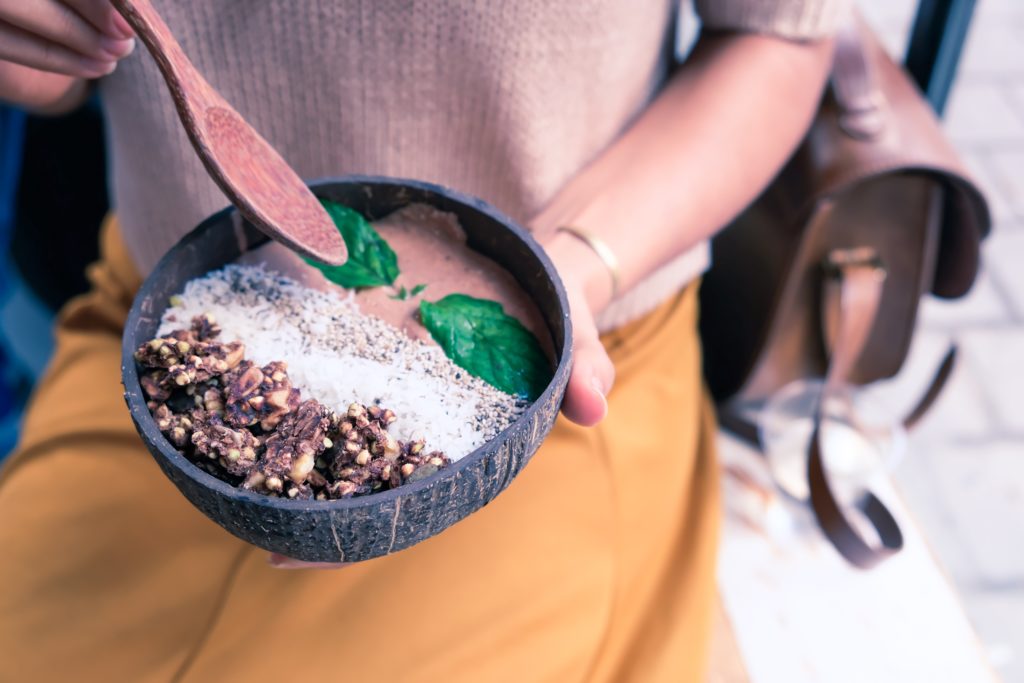Family caregiving and weight management seemed mutually exclusive. Caregiving is stressful. Comfort food is comforting. It is also fast and filling, which is exactly what we reach for when we are overwhelmed and juggling our many tasks. My strategy was simply to stay alive. It was survival eating, but it was killing me. Blood pressure and bloodwork results confirmed that my food choices were compounding the toll that stress was taking on my body. Menopause and middle age had already done a number on my mid section and I clearly needed a new plan. Routine and protein to the rescue!
I love to cook, but no longer have the energy, desire, mind space or time for this activity. The plan was to come up with a list of healthy foods that would offer enough variety and excitement so that loyalty would not feel limiting. I listed every protein intense food I could think of and then googled for more. We are veggie leaning, so my list didn’t include meat. From this list, I chose three breakfast options that could be alternated:
- Ezekiel 7-grain muffin (usually wins)
- Greek yogurt with frozen wild blueberries and protein powder (makes a great snack option if it doesn’t make the morning cut)
- Oats
We also have a fresh fruit option or add-on based on season and sales.
Lunch is always a salad loaded with vegetables and at least one plant based protein addition, but usually more. My creative food fix is met by adding herbs, making salad dressings and toasting sliced almonds when time allows. Our favorite protein adds are any combination of the following:
- Beans (there are so many varieties and are inexpensive when bought dried in bulk)
- Edamame (also a bean, but can be bought shelled and frozen, making it super convenient)
- Hard-boiled egg (these can be purchased boiled and shelled, usually in the deli or egg section)
- Tuna (we eat Safe Catch brand due to the low levels of mercury and Wild Planet due to their sustainable fishing practices)
- Quinoa
- Bulgar
- Lentils
- Almonds
- Hempseed
- Chia seed
- Nutritional yeast (which has a cheese flavor)
The key has been the snacks. I usually have one at 10am and another at 4pm, but in reality, anytime I’m hungry, I eat. Here is the down and dirty, clean list that is kept well stocked:
- Boiled egg
- Mixed nuts (nuts.com)
- Greek yogurt
- Protein bar (Think Thin, 10 grams of protein, 150 calories is my current bar of choice)
- Edamame (in the shell)
- Popcorn (popped with ghee and topped with nutritional yeast)
- Tuna
- Peanut butter (or any nut butter)
- Cottage cheese
- Roasted chickpeas (a treat when there is time to roast them)
Dinner is anything from the above options on hand, often popcorn with the cheesy flavored yeasty topping providing a nice balance of fiber and protein. This new strategy has saved time and head space. The grocery list and meal planning process has been streamlined and so has my waist. I haven’t been bored, hungry or felt deprived.
Finally, just like hunger affects my ability to think clearly and cope, hydration has a huge impact on my mood and overall feeling of well-being. Many apps remind us to stand or breath, I have one that reminds me to drink water. Some might scoff at the idea of a hydration reminder app. With all that is going on, I need to be reminded to keep my well full.
Navigating the Caregiver River: A Journey to Sustainable Caregiving is available on Amazon. Also, check out the Self-Caregiving Strategies Podcast.
Schedule Theresa Wilbanks to speak on caregiving and empower the caregivers in your workplace or community with the 12 Sustainable Caregiving Strategies.
Advice offered is for general information only; please contact your healthcare team, legal or financial advisors to guide your particular situation.


Pingback: Embrace the Routine - Sustainable Caregiving™
Pingback: Isolation 2.0 - Sustainable Caregiving™
Pingback: How Do We Sustain Our Ability to Provide Care? - Sustainable Caregiving™
Pingback: Self-Care During COVID-19: Lessons from Family Caregivers - Sustainable Caregiving™
Pingback: 10 Unexpected Gifts I Received from My Caregiving Experience - Sustainable Caregiving™